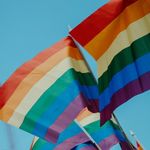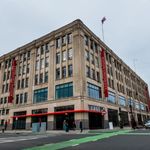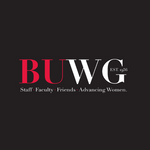Celebrating LGBTQIA+ Pride Month
 Expertise, diversity, philanthropy, and fellowship are woven throughout Boston University Women’s Guild, Women of Color Circle, and the greater BU community. Tapping into the University’s professional, academic, and philanthropic network, BUWG proudly welcomes a variety of presenters—all of whom share their experiences within their specified professions.
Expertise, diversity, philanthropy, and fellowship are woven throughout Boston University Women’s Guild, Women of Color Circle, and the greater BU community. Tapping into the University’s professional, academic, and philanthropic network, BUWG proudly welcomes a variety of presenters—all of whom share their experiences within their specified professions.
Celebrating LGBTQIA+ Pride Month
Audio file of post voiced by author Debbie Bazarsky
Pride Month occurs every June in commemoration of the Stonewall riots that took place in New York City June 28-July 3, 1969. Although gay and lesbian activism had been occurring for many years prior to 1969, the Stonewall riots are viewed as the beginning of the modern gay rights movement in the United States. In the wake of this visibility and activism, in December 1969, Boston University (BU) was one of only a handful of universities in the US, and the first in the Boston area, to establish a university-recognized student organization known as the BU Student Homophile League.
The following June, 52 years ago on June 28, 1970, the first Pride march—the Christopher Street Liberation Day March—was held in New York City in honor of the first anniversary of the Stonewall riots. The parade extended for close to 50 blocks and drew a few thousand participants. That year, pride marches also occurred in several other cities, including San Francisco, Los Angeles, and Chicago. A year later, in June 1971, the first Pride march took place here in Boston.
 Over the past five decades, Pride parades and marches have served an important role of visibility, resistance, activism, and celebration in the LGBTQIA+ community. I have had the pleasure to celebrate Pride in more than a dozen cities since my own coming out 25 years ago. For many years, there has been a strong critique of Pride festivals in the US, Canada, and UK for their history of racism, the exclusion of people of color and trans and nonbinary people in positions of leadership, the move toward “family friendly” events that has led to kink shaming and the corporatization of Pride with a focus on profitability over activism and visibility. A number of cities’ pride organizations, including Boston Pride, have faced organized boycotts over racism, trans exclusion, and commercialization. Boston Pride dissolved last summer, and therefore, there will not be a Boston Pride March this year.
Over the past five decades, Pride parades and marches have served an important role of visibility, resistance, activism, and celebration in the LGBTQIA+ community. I have had the pleasure to celebrate Pride in more than a dozen cities since my own coming out 25 years ago. For many years, there has been a strong critique of Pride festivals in the US, Canada, and UK for their history of racism, the exclusion of people of color and trans and nonbinary people in positions of leadership, the move toward “family friendly” events that has led to kink shaming and the corporatization of Pride with a focus on profitability over activism and visibility. A number of cities’ pride organizations, including Boston Pride, have faced organized boycotts over racism, trans exclusion, and commercialization. Boston Pride dissolved last summer, and therefore, there will not be a Boston Pride March this year.
Philadelphia, through the PHL Pride Collective, provides an excellent model of a reimagined Pride that centers Black and Brown queer and trans communities, highlights those still fighting for equality, and honors the origins of LGBTQIA+ liberation, including both Stonewall and historical activism in Philadelphia. This year in Boston, there will be the Third Annual Trans Resistance March & Festival for Black Trans Lives, The 25th Boston Dyke March, and a Pop-Up Pride.
Boston University is celebrating Pride Month through a collaboration between my office, the LGBTQIA+ Center for Faculty & Staff, the LGBTQIA+ Faculty & Staff Community Network, and the Queer Activist Collective with an organizing committee comprised of BU faculty, staff, and students. Back in 1970, the first BU Student Homophile League meeting was held in the Terrace Lounge at the George Sherman Union, and we will be revisiting the space for our kick-off event, a Pride Month Soirée for BU Faculty & Staff. We hope https://sites.bu.edu/outlist/pride-month/you will join us for one of the many BU Pride Month events. For allies, three particular events of interest may be Meeting the Health Needs of LGBTQ+ Patients: A Bi+ Perspective, Trans and Nonbinary Experiences in Higher Education: Exploring Heart-Centered Practice Through Storytelling, and Asexual and Aromantic Allyship in Queer Communities.
Pride Month is a meaningful time for many members of the LGBTQIA+ community. We hope you will celebrate with us. We also invite you to continue your own learning through attending the events listed above, joining us for next year’s Learn More Series with the a year of programming on the theme of exploring and understanding LGBTQIA+ Identity and Experiences, and engaging in training through BU D&I or through the LGBTQIA+ Center for Faculty & Staff’s BU Enacting Allyship for faculty and staff, a training about how to be an ally and better serve LGBTQIA+ students and colleagues that launches next year. If you are member of the LGBTQIA+ community, please come celebrate with us. If you are an ally, please show your support for your colleagues this June and join us in celebrating Pride this month and all year long.
Links of Interest

About the author: Debbie Bazarsky is the inaugural director of BU’s LGBTQIA+ Center for Faculty & Staff. She is the founding director of two additional LGBTQIA+ centers at Princeton University and the University of California, Santa Barbara. Most recently, she served as Dean of Diversity, Equity, and Inclusion and Dean of Enrollment, Engagement, and Diversity at the Pennsylvania College of Art & Design. Dr. Bazarsky has served as a faculty member and lecturer at numerous universities teaching in the areas of sexuality and gender, social justice education, and higher education administration. The work she enjoys leading most is LGBTQIA+ center work, and she is honored and excited to serve as the inaugural director of BU’s newly created LGBTQIA+ Center for Faculty & Staff.
 Explore our website and learn more about membership opportunities.
Explore our website and learn more about membership opportunities.